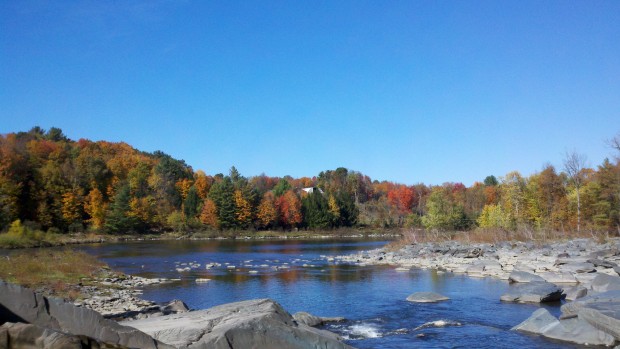We have much more to do and your continued support is needed now more than ever.
Fight to Keep Vermont Tar-Sands Free
Even as temperatures drop below freezing and we look ahead to another long winter, the fight to keep Vermont tar-sands-free is heating up. A group of volunteers, activists and community leaders from all corners of the state—as well as New Hampshire and Maine—is building momentum that will help us prevent an aging pipeline from being used to transport one of the dirtiest fuels in existence.
Much of that momentum comes from community meetings. Last week, as I drove home from a meeting with people from Newport, Irasburg, and Craftsbury, I reflected on the diversity of opinion that gives this movement its particular strength.
Everyone has a different concern
Some who stopped by the Newport meeting were worried about the climate impacts of exploiting Alberta’s tar sands, when science tells us that to avoid a climate catastrophe, tar sands have to stay in the ground.
Another was concerned about the toxic chemicals that companies mix with tar sands so that they can be pumped through pipelines—and the fact that even a minor leak could pollute any town’s water supply with cancer-causing chemicals such as benzene.

These concerns are not new, and because of them, the coalition to oppose tar sands in Vermont has made some heartening progress, thanks in no small part to the incredible diversity of opposition.
We’re winning
Positive developments from St. Johnsbury to Portland, Maine have us on the right track: (For some background on the issue and to get up to speed on the fight so far, follow this link.)
- While a hard-fought vote in South Portland fell less than 200 votes short of passing a measure that would prevent a pipeline reversal, the vote threw the oil industry on its heels. It spent about $170 per vote to mislead people into thinking the measure would have unintended consequences, but sentiment in South Portland against tar sands grew so strong the oil industry didn’t even try to make a case that tar sands had any benefits. With the overwhelming concern generated, the mayor has promised to keep South Portland tar sands free and the city council is devoting serious attention to other ways to keep tar sands out.
- With an important deadline just days before the Maine vote and likely as part of their campaign to confuse Mainers about what they’re really up to, Exxon gave up its right to appeal a Vermont judge’s decision that plans for the pipeline would be subject to Act 250 review, with accompanying review and public comment. This means Exxon is now almost certainly bound by the Act 250 process.
- Our elected officials have all signaled their opposition to tar sands here, with Gov. Peter Shumlin, Sen. Patrick Leahy, Sen. Bernie Sanders, and Rep. Peter Welch all making it clear that any plans must be carefully reviewed in light of economic and environmental implications for Vermont.
What’s next?
Opponents of tar sands in New England have momentum, numbers, and our elected officials on our side. Over the next few months, we will work to build the coalition that has already worked so hard on this issue, and make sure our voices are heard loud and clear from Montpelier, to Portland, to Washington, D.C.
- Residents from towns along the pipeline route (Jay, Troy, Newport, Irasburg, Barton, Sutton, Burke, Victory, Lunenburg, and Guildhall) are stepping up to get resolutions on the ballot at Town Meeting Day 2014 opposing tar sands. If you’d like to anchor a resolution in your town or help collect signatures to get a resolution on the ballot, click here – we have to get it done by mid-January. 29 towns from Craftsbury to Bennington passed these resolutions in 2012; we can make a statement by passing dozens more.
- We’re working with community groups all over the state to get a brief presentation on the agenda for chapter meetings and events so we can get even more Vermonters talking about their own reasons for opposing tar sands. To arrange a discussion at your group’s next meeting, get in touch with us here.
As people at the Newport meeting Wednesday night raised questions, debated the issues and volunteered for vital tasks going forward, it was not their differences, but what they had in common that was clear: Vermonters understand that tar sands have no place here.
On the drive home, I put the brakes on when I spotted a deer standing at the side of the road. When it turned back into the woods, I slowly pulled away, reflecting on one of the biggest reasons for opposing tar sands transport and use here, as well as their extraction in the first place: wildlife. Moose, deer, fish, birds and other animals all depend on a clean habitat to survive, and it’s our job to stand up for their home as well as ours.
Say No to Tar Sands
![]() Take a stand against dirty oil by urging the State Department to say no to tar sands in the northeast.
Take a stand against dirty oil by urging the State Department to say no to tar sands in the northeast.





















